Search titles
Displaying results 61 to 70 of 78.
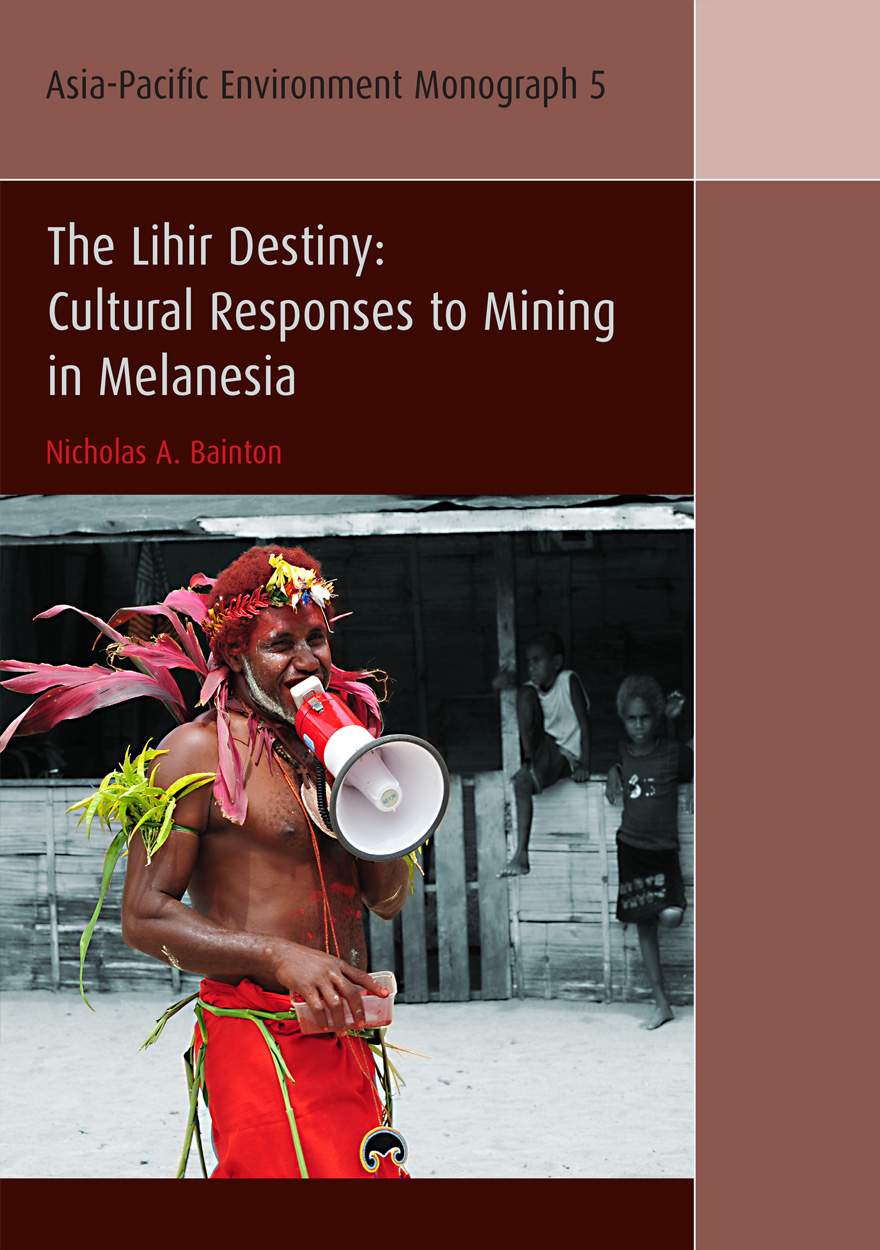
The Lihir Destiny »
Cultural Responses to Mining in Melanesia
Authored by: Nicholas A. Bainton
Publication date: October 2010
The people of the Lihir Islands in Papua New Guinea have long held visions of a prosperous new future, often referred to by local leaders as the ‘Lihir Destiny’. When large-scale gold mining activities commenced on the main island of Lihir in 1995, many hoped that this new world had finally arrived. The Lihir Destiny provides a nuanced account of the social structural and cultural transformations engendered by large-scale resource extraction. Tracing the history of Lihirian engagement with outside forces, from the colonial period through to recent mining activities, this book brings new light to bear on the bigger question of what ‘development’ means in contemporary Melanesia. The Lihir Destiny explores how Lihirian leaders devised future plans for a cultural revolution based upon the maximisation of mining activities and the influential philosophies of the Personal Viability movement. However, reaching the ‘Lihir Destiny’ is no simple affair, and many Lihirians find themselves negotiating divergent formulations of culture, sociality and economic engagement. The Lihir Destiny will appeal to readers interested in the social impacts of large-scale resource development, the processes of cultural continuity and change and the ways in which modernity is configured in local terms.
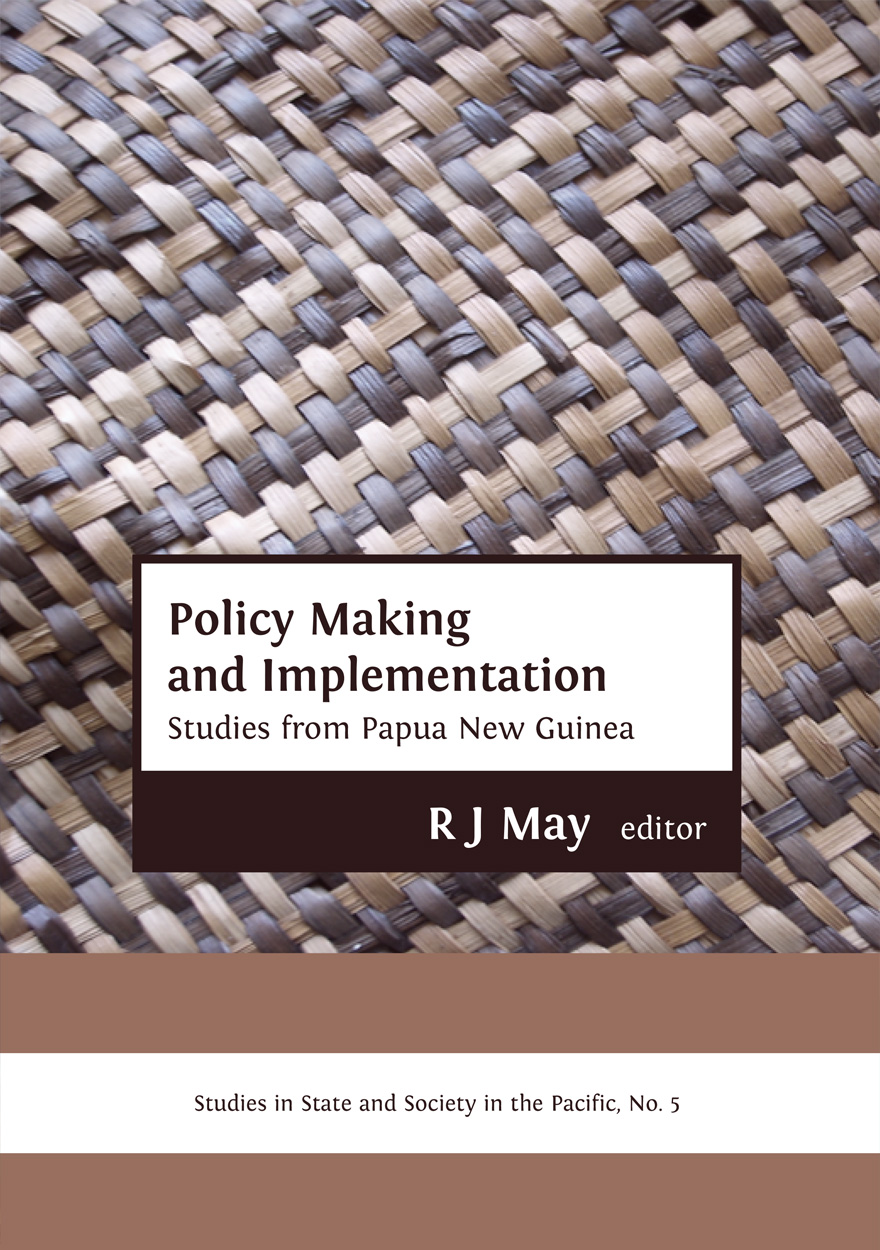
Policy Making and Implementation »
Studies from Papua New Guinea
Edited by: R.J. May
Publication date: September 2009
There is a vast literature on the principles of public administration and good governance, and no shortage of theoreticians, practitioners and donors eager to push for public sector reform, especially in less-developed countries. Papua New Guinea has had its share of public sector reforms, frequently under the influence of multinational agencies and aid donors. Yet there seems to be a general consensus, both within and outside Papua New Guinea, that policy making and implementation have fallen short of expectations, that there has been a failure to achieve ‘good governance’.
This volume, which brings together a number of Papua New Guinean and Australian-based scholars and practitioners with deep familiarity of policy making in Papua New Guinea, examines the record of policy making and implementation in Papua New Guinea since independence. It reviews the history of public sector reform in Papua New Guinea, and provides case studies of policy making and implementation in a number of areas, including the economy, agriculture, mineral development, health, education, lands, environment, forestry, decentralization, law and order, defence, women and foreign affairs, privatization, and AIDS.
Policy is continuously evolving, but this study documents the processes of policy making and implementation over a number of years, with the hope that a better understanding of past successes and failures will contribute to improved governance in the future.
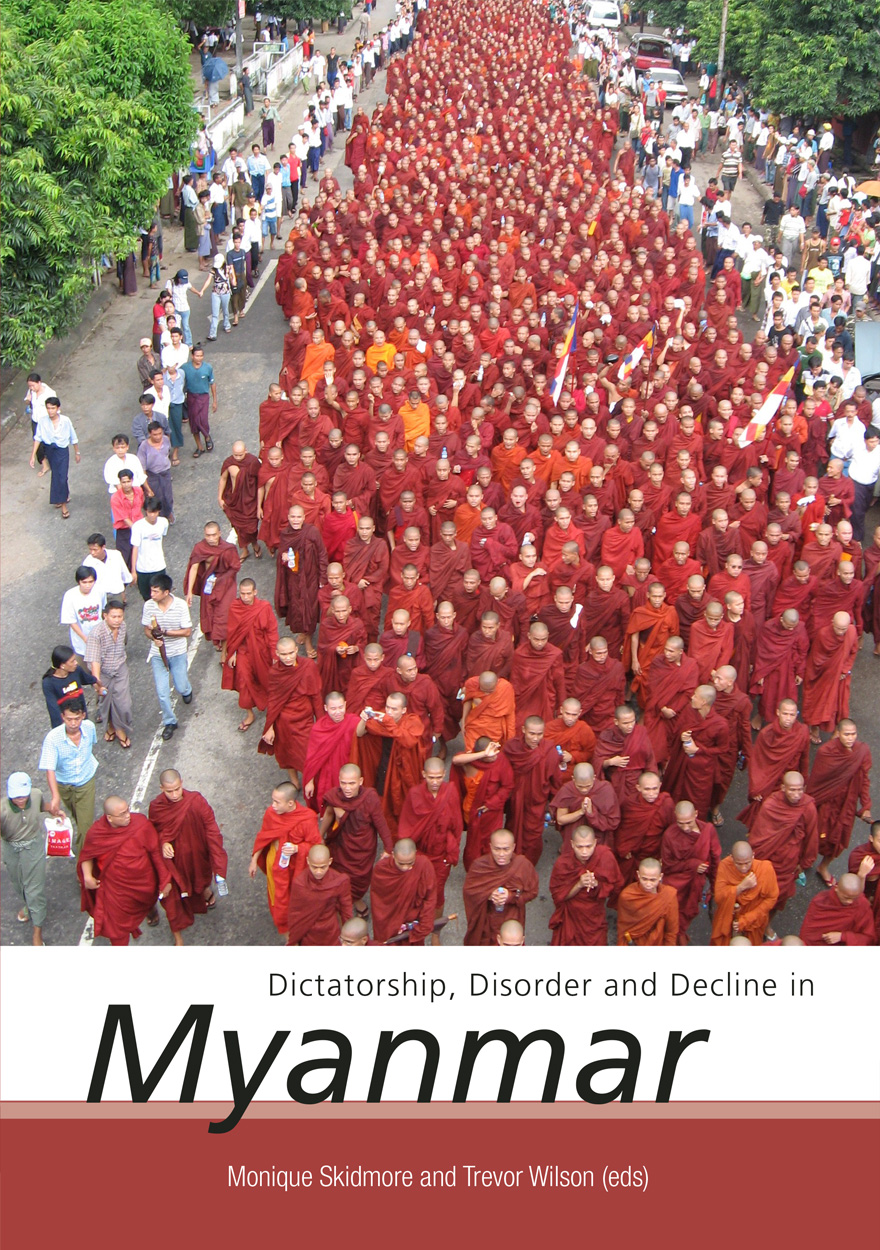
Dictatorship, Disorder and Decline in Myanmar »
Edited by: Monique Skidmore, Trevor Wilson
Publication date: December 2008
Mass peaceful protests in Myanmar/Burma in 2007 drew the world’s attention to the ongoing problems faced by this country and its oppressed people. In this publication, experts from around the world analyse the reasons for these recent political upheavals, explain how the country’s economy, education and health sectors are in perceptible decline, and identify the underlying authoritarian pressures that characterise Myanmar/Burma’s military regime.

Politics and State Building in Solomon Islands »
Edited by: Sinclair Dinnen, Stewart Firth
Publication date: May 2008
Politics and State Building in Solomon Islands examines a crisis moment in recent Solomon Islands history. Contributors examine what happened when unrest engulfed the capital of the small Melanesian country in the aftermath of the 2006 national elections, and consider what these events show about the Solomon Islands political system, the influence of Asian interests in business and politics, and why the crisis is best understood in the context of the country’s volatile blend of traditional and modern politics.
Until the disturbances of April 2006 and subsequent deterioration in bilateral relations between Australia and Solomon Islands under the Sogavare government, experts had hailed the Regional Assistance Mission to Solomon Islands (RAMSI) as an unqualified success. Some saw it as a model for ‘cooperative intervention’ in ‘failing states’ worldwide. Following these developments success seems less certain and aspects of the RAMSI model appear flawed.
Using the case of Solomon Islands, this book raises fundamental questions about the nature of ‘cooperative intervention’ as a vehicle for state building, asking whether it should be construed as a mainly technical endeavour or whether it is unavoidably a political undertaking with political consequences. Providing a critical but balanced analysis, Politics and State Building in Solomon Islands has important implications for the wider debate about international state-building interventions in ‘failed’ and ‘failing’ states.

Capturing Wealth from Tuna »
Case Studies from the Pacific
Authored by: Kate Barclay, Ian Cartwright
Publication date: January 2008
The Western and Central Pacific Ocean is home to the largest tuna fishery in the world – around half of the world’s tuna supply – and is a vital economic resource for Pacific island countries.
The potential of the Pacific tuna fishery to contribute to economic development in the Pacific island countries is enormous, but will require a cooperative regional strategy to maximise access fees from distant water fishing nations, as well as targeted domestic policy and legislation to encourage local fishing industries. Together with the importance of acting strategically with regard to such a variable resource, the lesson of fisheries management globally is that it is most effective when it takes into consideration social, cultural and political contexts.
Based on an extensive study of six Pacific island states, Capturing Wealth from Tuna maps out the aspirations and limitations of six Pacific island countries and proposes strategies for capturing more wealth from this resource in a sustainable and socially equitable manner.
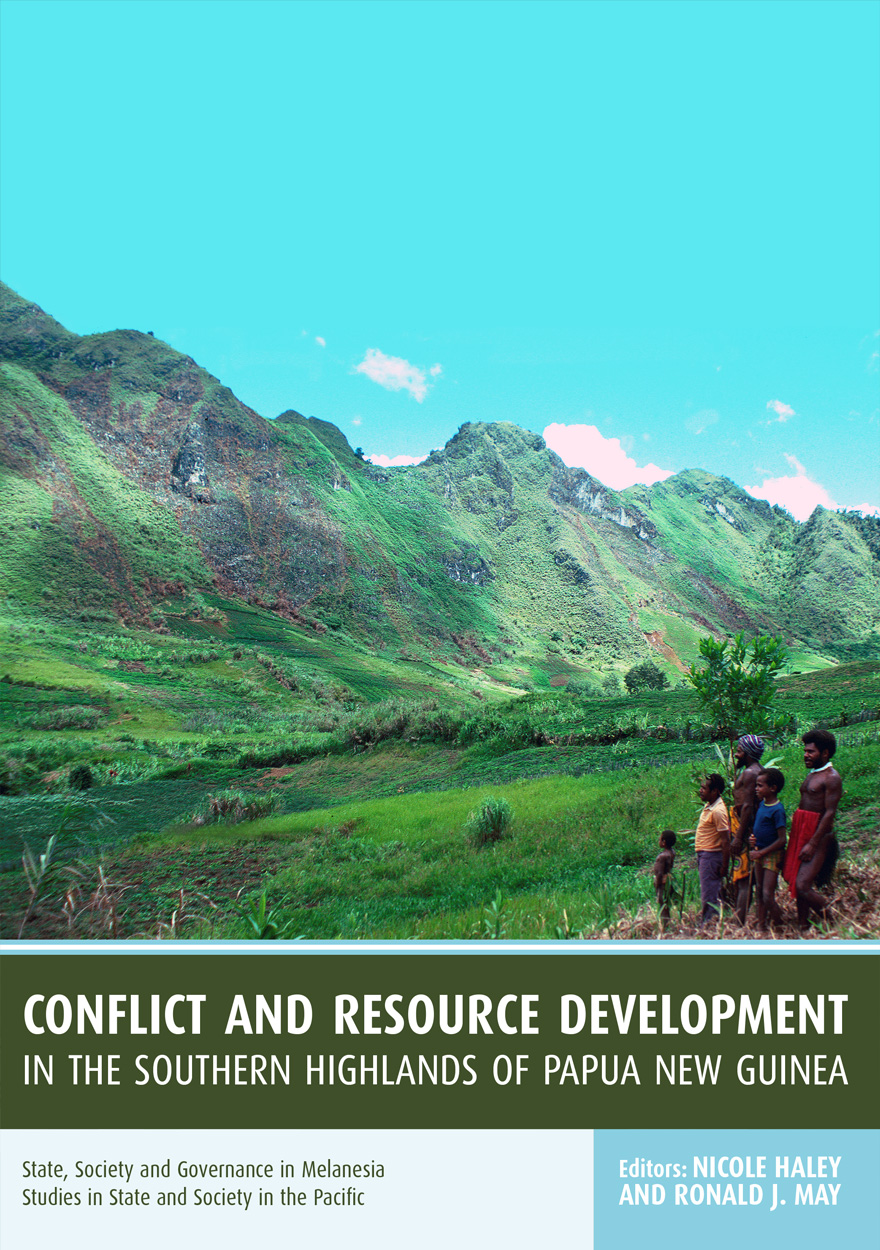
Conflict and Resource Development in the Southern Highlands of Papua New Guinea »
Edited by: Nicole Haley, R.J. May
Publication date: November 2007
The Southern Highlands is one of Papua New Guinea’s most resource-rich provinces, but for a number of years the province has been riven by conflict. Longstanding inter-group rivalries, briefly set aside during the colonial period, have been compounded by competition for the benefits provided by the modern state and by fighting over the distribution of returns from the several big mining and petroleum projects located within the province or impinging upon it. Deaths from the various conflicts over the past decade number in the hundreds. As a result of inter-group fighting, criminal activity and vandalism, a number of businesses have withdrawn from the province. Roadblocks and ambushes have made travel dangerous in many parts and expatriate missionaries and aid workers have left. Many public servants have abandoned their posts with the result that state services are not provided. Corruption is rife. Police are often reluctant to act because they are outnumbered and outgunned.
This volume brings together a number of authors with deep experience of the Southern Highlands to examine the underlying dynamics of resource development and conflict in the province. Its primary purpose is to provide some background to recent events, but the authors also explore possible approaches to limiting the human and economic costs of the ongoing conflict and breakdown of governance.

Myanmar »
The state, community and the environment
Edited by: Monique Skidmore, Trevor Wilson
Publication date: October 2007
Despite deteriorating economic and developmental conditions, worsening environmental problems, and troubles arising from the unresolved status of its ethnic minorities, Myanmar seems no closer to a political resolution. Myanmar’s economy continues to stagnate, with severe implications for its people. Low levels of international assistance have exacerbated the situation.
Myanmar—the state, community and the environment examines the missed opportunities by government and opposition groups to find a way out of the political impasse and improve the standard of living of the people of Myanmar.
This collection provides insights into the country’s economic development, in particular the vital rice-marketing sector and the attempts to expand existing industrial zones. It focuses, for the first time, on Myanmar’s environmental governance with in-depth case studies, and on the increasing need for effective environmental protection and sustainability.

Boats to Burn »
Bajo Fishing Activity in the Australian Fishing Zone
Authored by: Natasha Stacey
Publication date: June 2007
Under a Memorandum of Understanding between Indonesia and Australia, traditional Indonesian fishermen are permitted access to fish in a designated area inside the 200 nautical mile Australian Fishing Zone (AFZ). However, crew and vessels are regularly apprehended for illegal fishing activity outside the permitted areas and, after prosecution in Australian courts, their boats and equipment are destroyed and the fishermen repatriated to Indonesia. This is an ethnographic study of one group of Indonesian maritime people who operate in the AFZ. It concerns Bajo people who originate from villages in the Tukang Besi Islands, Southeast Sulawesi. It explores the social, cultural, economic and historic conditions which underpin Bajo sailing and fishing voyages in the AFZ. It also examines issues concerning Australian maritime expansion and Australian government policies, treatment and understanding of Bajo fishing. The study considers the concept of “traditional” fishing regulating access to the MOU area based on use of unchanging technology, and consequences arising from adherence to such a view of “traditional”; the effect of Australian maritime expansion on Bajo fishing activity; the effectiveness of policy in providing for fishing rights and stopping illegal activity, and why Bajo continue to fish in the AFZ despite a range of ongoing restrictions on their activity.

Globalisation and Governance in the Pacific Islands »
State, Society and Governance in Melanesia
Edited by: Stewart Firth
Publication date: December 2006
The Pacific Islands are feeling the effects of globalisation. Free trade in sugar and garments is threatening two of Fiji’s key industries. At the same time other opportunities are emerging. Labour migration is growing in importance, and Pacific governments are calling for more access to Australia’s labour market. Fiji has joined Samoa, Tonga, Tuvalu and Kiribati as a remittance economy, with thousands of its citizens working overseas. Meantime, Papua New Guinea and Solomon Islands grapple with an older kind of globalisation in which overseas companies exploit mineral and forest resources.
The Pacific Islands confront unique problems of governance in this era of globalisation. The modern, democratic state often fits awkwardly with traditional ways of doing politics in that part of the world. Just as often, politicians in the Pacific exploit tradition or invent it to serve modern political purposes.
The contributors to this volume examine Pacific globalisation and governance from a wide range of perspectives. They come from Papua New Guinea, Solomon Islands, Hawai’i, the Federated States of Micronesia, Samoa, Fiji, New Zealand and Jamaica as well as Australia.
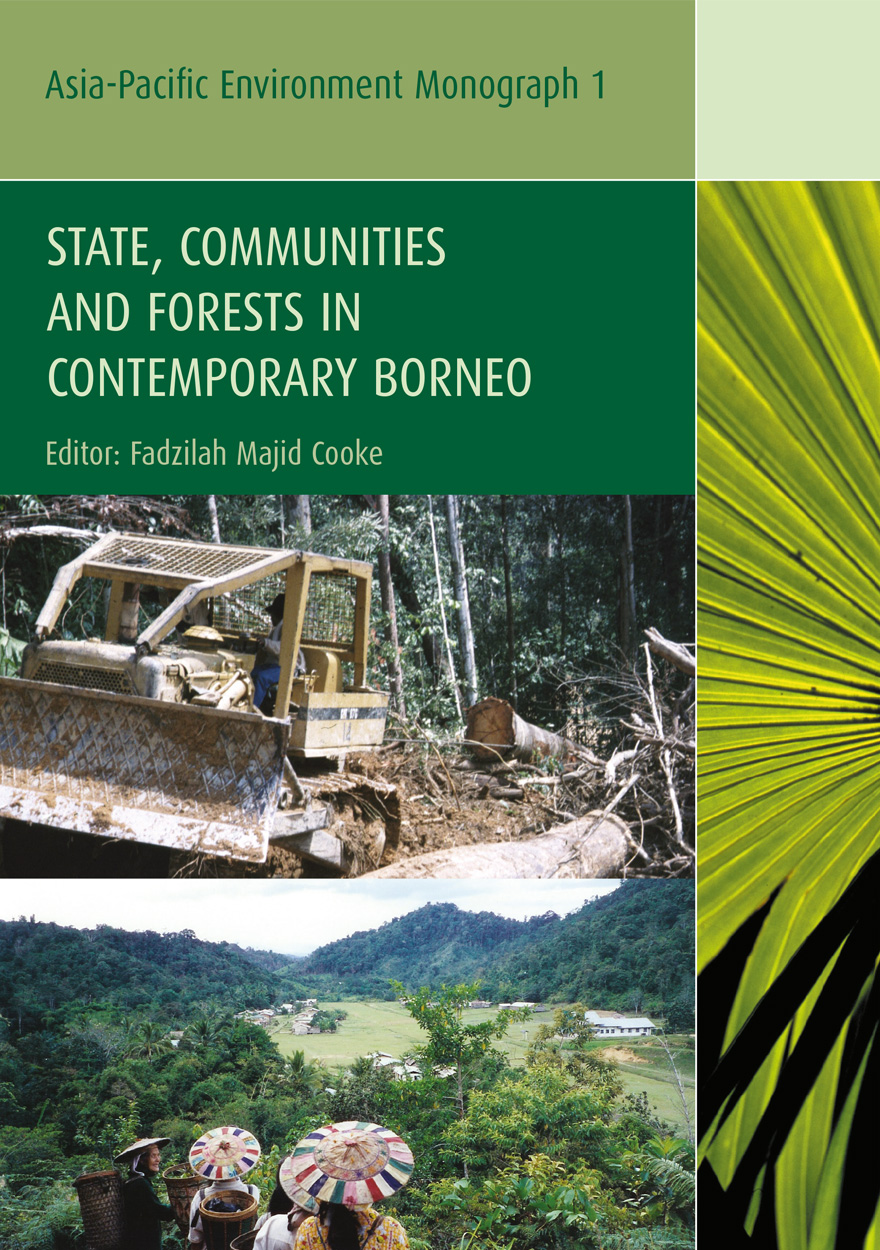
State, Communities and Forests In Contemporary Borneo »
Edited by: Fadzilah Majid Cooke
Publication date: July 2006
The name ‘Borneo’ evokes visions of constantly changing landscapes, but with important island-wide continuities. One of the continuities has been the forests, which have for generations been created and modified by the indigenous population, but over the past three decades have been partially replaced by tree crops, grass or scrub. This book, the first in the series of Asia-Pacific Environmental Monographs, looks at the political complexities of forest management across the whole island of Borneo, tackling issues of tenure, land use change and resource competition, ‘tradition’ versus ‘modernity’, disputes within and between communities, between communities and private firms, or between communities and governments. While it focuses on the changes taking place in local political economies and conservation practices, it also makes visible the larger changes taking place in both Indonesia and Malaysia. The common theme of the volume is the need to situate local complexities in the larger institutional context, and the possible gains to be made from such an approach in the search for alternative models of conservation and development.



